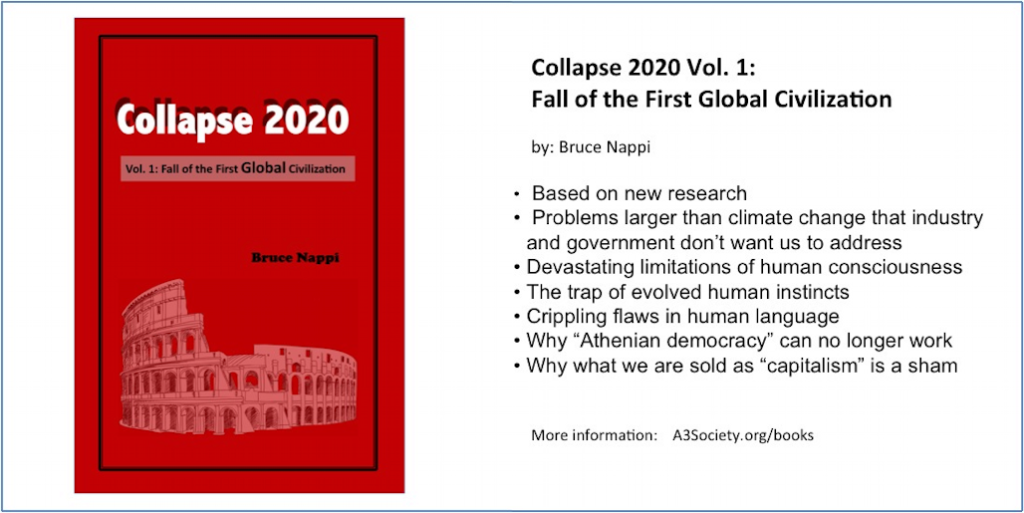In a Tweet about leadership, educator Danny Steele said, “Complex problems do not usually have simple answers. Good leaders recognize that “quick fixes” are not the goal… and they understand that meaningful solutions are usually the result of collaborating with others in the organization, thoughtfully analyzing the issues.” But for so many complex issues, though people try very hard to understand them, even after very long attempts to understand them, good solutions remain elusive. Why?
Based on the research that led to the brain discoveries presented in Collapse 2020 Vol. 1: Fall of the First Global Civilization, it became clear to me that many humans just do not have the “broad thinking” ability to intuitively visualize and understand explanations of complex principles based on information presented to them. Unfortunately, the processes our “democratic” system has developed for electing and appointing leaders do not identify and select people in proportion to their ability to handle complex issues. In fact, the opposite is true. What the general public responds to are “promises” to deliver “quick fixes”, and very simple explanations for problems, no matter how complex they are. The result is flooding the “leadership” of governments with people who are “street smart” but very “narrow minded”. They are quick with answers that satisfy the narrow concerns raised in questions. They have memorized a huge set of “sound bites” that audiences accept. But their ability to address complexity is typically very poor.
In my books, I call these narrow visualizations, “Single Sentence Logic”. This means, for each statement – i.e. each sentence – all that matters is the basic concepts within that specific sentence conform to some social norm: “opposites attract”, for example. They don’t have to make sense against any larger set of logic – only within that single sentence. Using this example, most people would agree that north pole magnets do attract south pole magnets, plus electric charges attract negative electric charges, and females attract males. But hold on now. Does day attract night? Does right attract wrong? Looking at some situations that are more complex, how would “opposites attract” explain the gay and lesbian attraction issue? How would it explain race relations between black and white skin people? Do these attract?
As the problems of life become more complex, the pervasive broad inability of world leaders to understand complexity is leading our civilization into chaos and ultimate collapse.
To explain this issue, first let me clarify a few terms. By ‘narrow minded’ I do not mean what is typically called IQ. The term “narrow minded” can apply over the full range of the IQ scale, though it tends to occur more with lower IQ levels. What I call “narrow minded” is more closely related to isolated limitations we find frequently in society: belief in superstition, religious fervor, nationalism, social elitism, etc. It can also be similar to more extreme limitations such as: phobias, traumatic distress syndrome, socially induced depression, or narcissistic disorders.
The point of these examples is to stress that, for people with this trait, presenting them with more explanations, more complex theories, detailed models, lots of data, lots of math, etc. to get them to change their view of something, is not effective. Their minds are not able to assimilate and visualize it.
Using phobia as a specific example, we can provide a person afraid of flying with all the information in the world that air travel is, in fact, the SAFEST form of travel. But when the plane takes off, they become filled with panic and react as if they are in a life threatening situation. I once sat next to woman like this on a flight. It was not a case of just, “I’m very nervous about this.” It was a full physiological response. As the engines started to scream and the cabin began shaking, she broke into pouring sweat. She started to shake. She started to yell that she was burning up. She pulled off her blouse down to her underwear and then broke down crying. I’m a pilot. I had never seen this first hand before. And, until I did, I thought all such descriptions were exaggerations.
Second, I want to strongly stress that I am making NO judgmental statement here. I did not BLAME this woman for being uncaring about other passengers, or putting on an act to gain attention. This was a fully subconscious and uncontrollable behavior.
That said, what if one of our political leaders, for some reason, had an inability to look inside him, or herself to question their thought processes for flaws? What if they were unable to comprehend more than just minimal complexity? And what if the process we used to select and elect them actually drew this ‘trait’ out in the extreme? The adage, ‘falls on deaf ears’ comes to mind. What I’m saying is, this adage could actually apply to our current situation in the extreme. And if 51% of government were filled with such people, because of the process we used to select them, then it is “we, the people” who need to ask, ‘why do we keep beating our heads against the same wall’? Do we have some of this ‘trait’ in ourselves as well? Is working through ‘DEMOCRACY’, at least the version we have created, which we think is the only way democracy can work, just another form of not being able to hear?
This view of our current social position is discussed at length in Collapse 2020 as well as in many topics on A3society.org.

